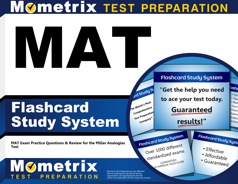The Miller Analogies Test (MAT) assesses both analytical skills and academic content that are critical to success in graduate education. The MAT should be taken by students applying to graduate school programs that require the MAT, though not all graduate programs require it.
The test consists solely of 120 partial analogies and must be completed in 60 minutes. The test measures general knowledge about the humanities, natural sciences, mathematics, and social science. Of the 120 questions, 100 of them will count towards the final score and the other 20 are experimental. Test takers will not know which of the questions are experimental.
The relationship types included in the MAT include semantic, classification, association, and logical/mathematical. Test takers are encouraged to pace themselves and skip difficult questions before coming back to them (there are no breaks when taking the MAT). Points are not deducted for wrong answers, so test takers should make sure to at least attempt to answer every question.
The MAT is designed to test general and academic knowledge and analytical skills that have been acquired over a long period of time; cramming before the test will do little good. When taking the exam, a common strategy used is to read each of the three terms given and, before looking at the answer options, attempt to think of what the fourth term should be. While it may be possible to come up with more than one final term that may seem to fit, there is always only a single valid and logical relationship between the pairs of terms.
The MAT can be taken at more than 500 testing centers in the United States. Test takers can register for the MAT at the MAT website. During registration, a testing center will be selected, and test takers should be mindful that each testing center determines both its own fees for taking the MAT as well as its testing schedule.
The testing fee includes up to three official transcripts that will be mailed to selected institutions at no additional cost, though those recipients must be designated when the test is taken in order to avoid incurring additional fees. If more than three transcripts need to be sent, additional fees will be incurred (currently $25 per transcript and subject to change).
When taking the MAT, test takers are not allowed to have personal items with them. Other than identification, the only other item that test takers would need to bring with them would be a piece of paper with the address of the school they want the scores sent to if the test taker feels that they are not listed in among the MAT School Codes. This paper will need to be inspected by testing center staff.
Test takers with disabilities are able to request special testing accommodations. Most testing centers are able to make accommodations, so anyone requiring them should contact their preferred testing center directly many weeks before the scheduled exam date, as the materials must be received six weeks prior to the testing date. Documentation will need to be provided to MAT detailing the types of accommodations required, and there is no additional charge for taking the exam with accommodations.
Approximately 10 to 15 business days after the MAT is taken, an official score report will be mailed. The score will include both a scaled score and a percentile rank. The scaled score ranges from 200 to 600 with an average of 400. A scaled score of 400 would have a corresponding percentile rank of 50 percent. There is no passing score for the MAT, though institutions may have their own requirements for admission to the program. For those who feel that there may have been an issue with how their exam was scored, score verification can be requested. The fee for this is $35 (subject to change), though it rarely results in a change in the final score. In the event of a change, however, the fee will be reimbursed and corrected transcripts will be sent to all institutions that received an original transcript.
Test takers may elect to retake the exam if they are displeased with their original scores. There is no official policy as to how often the MAT can be retaken, though test takers are encouraged to check with the institutions to which they are applying if they have policies regarding repeat scores. The official MAT website does provide online practice tests as well as practice exams, and outside organizations provide preparation guides and services as well. However, those planning to take the MAT should focus more on learning test-taking strategies specific to the analogy questions and should be less concerned with attempting to master actual testing content because it is too wide-ranging to even attempt to review fully.
MAT Study Guide
Explore our free MAT review provided by Mometrix. Check out our premium MAT study guide to take your studying to the next level. If you benefit from these materials, just click the link below! To compliment our MAT book, we also offer extensive flashcards for even more MAT test prep help. We hope you enjoy our products! Your purchase helps us make more great, free content for test-takers just like yourself.




